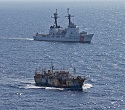 The Obama administration marked a significant milestone in efforts to combat illegal, unreported, and unregulated (IUU) fishing and seafood fraud internationally with the signing of the “Illegal, Unreported, and Unregulated Fishing Enforcement Act,” on November 5, 2015. This legislation addresses the first recommendation of the Action Plan created by the President’s Task Force on Combating IUU Fishing and Seafood Fraud.
The Obama administration marked a significant milestone in efforts to combat illegal, unreported, and unregulated (IUU) fishing and seafood fraud internationally with the signing of the “Illegal, Unreported, and Unregulated Fishing Enforcement Act,” on November 5, 2015. This legislation addresses the first recommendation of the Action Plan created by the President’s Task Force on Combating IUU Fishing and Seafood Fraud.
“Illegal, unreported, and unregulated fishing undermines both the economic and environmental sustainability of our nation’s fisheries,” said Kathryn Sullivan, Ph.D., under secretary of Commerce for oceans and atmosphere and NOAA administrator. “Combating IUU fishing and seafood fraud is critical to sustaining the resilience of our global ocean fisheries, to leveling the playing field for the United States fishing and seafood industries, and to protecting the United States’ reputation as a leader in sustainable seafood. Passage of this bill is a step in the right direction, and will help the United States advance its ongoing efforts to achieve sustainable fisheries.”
The legislation includes several provisions designed to prevent illegally harvested fish from entering the United States, and supports efforts to achieve sustainable fisheries around the world, including the Port State Measures Agreement (PSMA). The PSMA requires foreign fishing vessels to give adequate notice of intent to visit ports, restricts the entry of fishing vessels known or suspected to engage in illegal fishing, and denies port services to such vessels.
The United States now joins 13 other nations that have already ratified the PSMA, which will be legally binding once a total of 25 countries have ratified it.
Although the United States already implements most of the measures outlined in the PSMA, formal ratification of this agreement provides the United States with additional leverage to expand ratification and adoption of these measures at ports around the world. The measures adopted by the passage of the bill will also benefit U.S. fishermen, seafood buyers, and consumers by preventing vessels carrying fish caught illegally from entering U.S. ports and keeping illegal product out of the market. These actions protect domestic fishermen from unfair competition and ensure consumer confidence in the seafood supply chain.
The bill also implements U.S. commitments under the Antigua Convention that updates the framework for managing shared stocks of tunas and other highly migratory species in the eastern Pacific Ocean and strengthens the ability of the United States to address fishing activities of concern by foreign nations under the High Seas Driftnet Fishing Moratorium Protection Act.
The next critical step toward successful implementation of the IUU Task Force’s recommendations is enhancing the U.S’s ability to prevent IUU fish and fish products from entering U.S. commerce by strengthening domestic enforcement authorities. Many existing authorities are focused on at-sea or dockside enforcement of U.S. fishing operations and do not provide the tools needed to address fishing violations.
As identified by the Task Force public comment process, these are crucial gaps in federal authorities that prevent agencies from monitoring the entirety of the seafood supply chain and fully protecting law-abiding U.S. fishermen and consumers.
